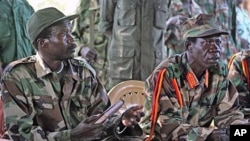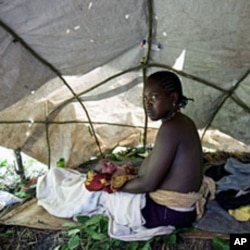Human-rights activists and victims are eagerly awaiting U.S. government action against the East Africa-based Lord's Resistance Army. A U.S. law signed earlier this year mandates President Barack Obama to devise a strategy before November 20 to stop the rampaging rebel group.
John Prendergast of the U.S.-based Enough Project was one of many activists who welcomed the LRA Disarmament and Northern Uganda Recovery Act that was signed into law in May.
"You had a bipartisan consensus bill that had the highest number of cosponsors for an Africa-related bill in congressional history and the highest number of cosponsors for any bill in 2010," said Prendergast.
He says the onus now is on President Obama to stop this group which first started as a rebellion against Uganda's government in the 1980s and evolved into a brutal movement led by Joseph Kony.
"Twenty-five years have gone by where this guy has gone around, blitzing around northern Uganda and now into three or four countries in Central Africa still kidnapping kids, still cutting the lips off of women, still burning buses and villages and doing all kinds of stuff," Prendergast said. "Raping systematically in certain villages with a militia of no more than 600, 700 people, probably the highest ratio of damage to number of militia in the history of warfare, and we cannot do anything about that? No, you are going to do something about it."
Independent journalist Joe Bavier has been investigating recent activities of the LRA for the U.S.-based Pulitzer Center on Crisis Reporting. Bavier says the group scattered in several directions after the failed December 2008 joint attack on a LRA camp in the Garamba forests of the Democratic Republic of Congo by armies of several African countries, with logistical support from the U.S. government.
"They are everywhere. They have scattered in the northern Democratic Republic of Congo," said Bavier. "They loot, they carry out attacks in southern Sudan. Joseph Kony, himself, and Okot Odhiambo, one of the other commanders that is wanted by the International Criminal Court in The Hague, have been been operating in southeastern Central African Republic. The impact has been felt in an area where there has basically been no protection of civilians."
Since late 2008, the United Nations and aid groups estimate that the LRA has killed more than 2,000 people, abducted a similar number, and displaced hundreds of thousands of others.
Bavier who has been to areas where the LRA recently committed atrocities says people there are aware of the U.S. law and have very high expectations.
"It is a wish list, basically. They really do hope and expect, even in a lot of cases, the Americans deploy troops on the ground in LRA-affected areas, and take care of the military side of this, personally. And they also expect a lot of humanitarian assistance in these areas," he said.
But Bavier says a complicating factor to the issue is that reports indicate Kony may be seeking safety in the war-wracked western Sudan region of Darfur.
"He has long been an ally of Khartoum. And if he can find safe haven and support in Darfur and perhaps create alliances with pro-Khartoum militias, like the janjaweed in Darfur, we may be looking at a whole new ball game," Bavier added.
The janjaweed are pro-Khartoum militias accused of committing atrocities against civilians in Darfur. Like Joseph Kony, Sudan's President Omar al-Bashir is wanted by the International Criminal Court in The Hague on charges of genocide, war crimes and crimes against humanity - charges he denies and calls a Western plot against him.
Kony faces several dozen charges, including murder, sexual enslavement and rape. He has also denied the charges, describing himself as a freedom fighter guided by the Bible's Ten Commandments. Kony says accusations against him are propaganda by Uganda's government.





